BERLIN, September 18, 2025 – On a windy September afternoon, the city’s top deep tech investors gathered at Lanolin Fabrik, a former factory that houses Fraunhofer HHI’s research and venture activities. The occasion was a private Investor Demo Day hosted by Silicon Allee, the startup department within Fraunhofer HHI, presenting the first group of startups emerging from its deep tech accelerator.
What sets these startups apart is the environment they’re building in. Fraunhofer, often referred to as the MIT of Germany, is a globally respected network of applied research institutes behind some of Europe’s most important technological advances. Fraunhofer HHI — the institute behind this program — is a leader in AI, imaging, and communication technologies.
The evening also featured a keynote by author and futurist Thomas R. Weaver, whose novel Artificial Wisdom explores the future of AI and ethics. His talk drew connections between science fiction and research-driven innovation.
This Demo Day marked the first public presentation of startups building under a new model. Investors in attendance included Redstone, HTGF, Identity, Matterwave, Capital D, Ventech, and Digital Square.
Meet the startups
hoopooh
hoopooh is reinventing early education. At its heart is an AI-first platform that takes away the tedious weight of paperwork, freeing teachers to do what they were born to do – nurture and inspire children. It transforms documentation, reporting, and communication into something simple, powerful, and beautifully human. The team of 3 founders and fathers — Amir, Ayoub, and Dahy — have 7 children between them.
Together they bring expertise in gamification, machine learning, and strategy, shaped by experiences at Volkswagen, the UN, and German Telekom, Amadeus, Rebuy… and sharpened at world-class institutions like École Polytechnique, the Technical University of Berlin, and Stanford. They share one vision: to give educators the clarity to see each child’s journey, and parents the connection to be part of it. Already in classrooms across Germany, Egypt, and Qatar, hoopooh is proud to be an official partner of Qatar Foundation.
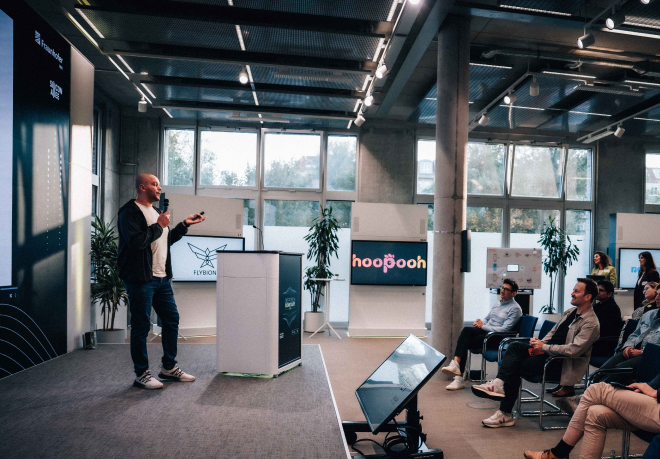
Flybionic
Flybionic is building autonomous drones for infrastructure inspection and disaster response — designed to fly safely and independently in GPS-denied or hard-to-reach environments. The platform enables BVLOS (Beyond Visual Line of Sight) operations using onboard AI and real-time communications, removing the need for manual piloting.
The drone’s ultra-light, 450g fixed-wing design reduces crash risk, while its wireless communications system builds on Fraunhofer HHI research in 4G/5G to enable reliable control and data transfer. All operations are managed via a secure, German-hosted cloud platform with mission planning and AI-based analysis tools.
Founded by Tom Piechotta, a researcher at Fraunhofer HHI, the team is already piloting with public sector partners.
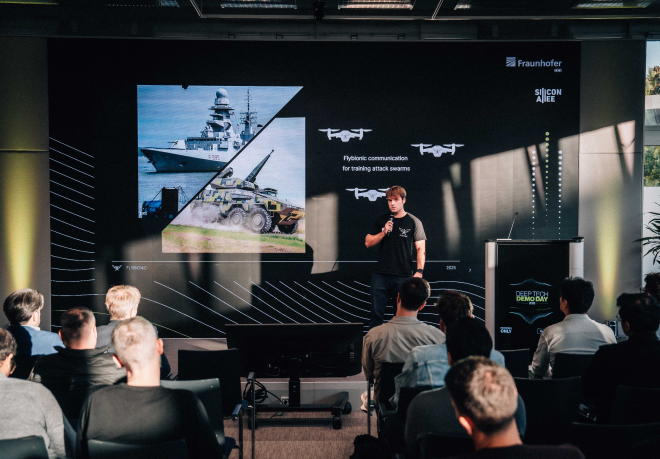
Anita
Anita has developed an AI-powered legal research platform that helps lawyers executing legal research from information extraction to text creation. The system delivers structured, sourced and hallucination-free answers based on real case law, cutting down the time lawyers spend on routine research. The software was developed as a spin-off from the Free University of Berlin and Fraunhofer HHI, with a focus on explainability and data protection. Unlike general-purpose tools, Anita shows exactly how its answers are generated, with no black-box reasoning or hallucinated content.
The founding team – Til Martin Bußmann-Welsch,Frederik Tholey, and Jannis Schmidl – brings together legal and technical backgrounds. Today, over 500 law firms use Anita to speed up research and refocus time on strategy and client work. And every day 2 more law firms join Anita on its journey.
Anita is currently not fundraising but is looking for contacts for its round upcoming soon. Get in touch with Til via LinkedIn.

Neptune
Neptune is reimagining how children learn music with a gamified, motion-tracking platform that gives real-time feedback on posture, technique, and progress. The system uses computer vision to analyse movement and turn practice into a personalised, interactive experience — no extra hardware needed.
The platform is designed around a space-themed learning journey where kids unlock missions, earn rewards, and chart their progress via a visual dashboard. It’s already being piloted in schools and homes in Berlin, making music education more accessible, playful, and effective.
Founded by Aleyna Tunca, a professional violinist and former music school director, and Ilkyaz Koca, with experience in building and scaling an AI SaaS startup and in expansion and business development, the team combines deep expertise in education and technology. Neptune is also the first female-founded startup accepted into Silicon Allee at Fraunhofer HHI.
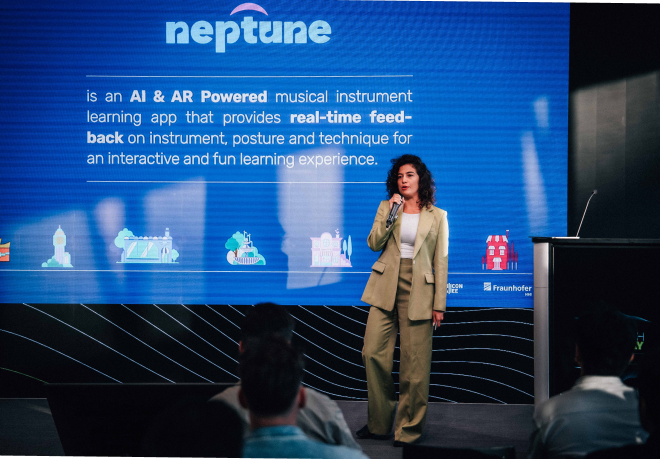
Spin Digital
Spin Digital develops high‑performance video codecs and media software aimed at ultra‑high quality formats such as 4K, 8K, wide colour gamut, HDR, high frame rates, and immersive video and VR applications. Their stack includes HEVC/H.265 and VVC/H.266 encoders, decoders, live encoders, file transcoders, and SDKs that let partners embed or integrate Spin’s tools into custom media workflows.
The technology is built on years of research in video codec engineering, software optimization, and computational architecture – aiming to deliver high quality with efficient performance even on commodity hardware.
Spin Digital is led by Chi Ching Chi (CEO), Mauricio Alvarez‑Mesa (COO) and a team of engineers focused on advancing video quality. The product is already being used in international B2B settings, with customers demanding pushing both visual fidelity and bandwidth/resource efficiency.
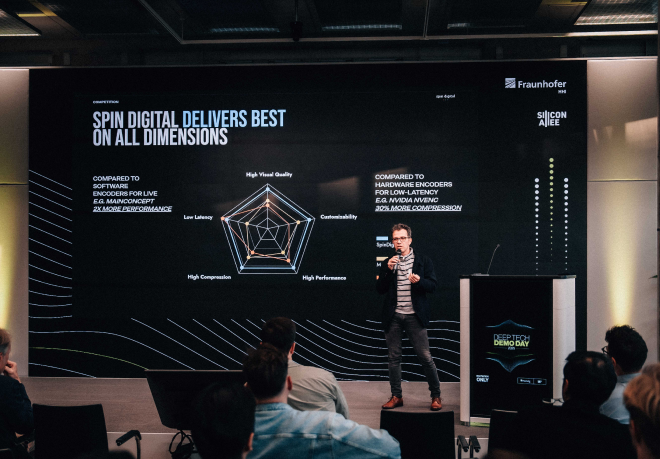
iMouse
iMouse is an AI video analysis system built for digitalizing preclinical research. It captures continuous behavioural data from rodents in home‑cage conditions, producing science-expert‑validated digital biomarkers that improve objectivity and enables reproducibility in studies.
The approach relies on standardized digital data acquisition and a vision AI based monitoring system, reducing subjective bias and streamlining automatic behavioural recognition. This level of precision helps labs get objective data faster.
Co-founded by Mirko Lampe, a digital transformation expert with a background in industrial IoT and product strategy, the team combines domain expertise from neuroscience, AI, and digital systems. iMouse is currently being used in academic and pharmaceutical settings and is open to new research and investment partnerships.
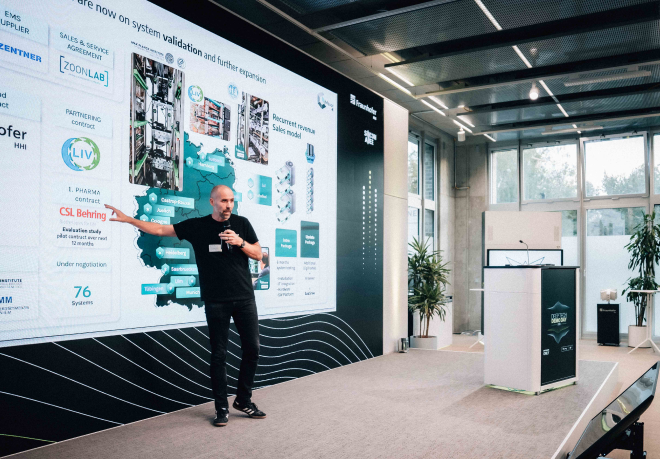
The program behind it
For startups working on complex and hard-to-copy tech, Silicon Allee at Fraunhofer HHI offer the research access, infrastructure, and support needed to develop key technology and lay the foundations for scalable, investable companies.
Silicon Allee at Fraunhofer HHI supports a selected group of startups each year. The program is designed to help early-stage deep tech teams become investor-ready without the typical restrictions of tech transfer. There are no licensing fees, board seats, or upfront equity requirements. Instead, Fraunhofer HHI takes a virtual share, participating only if the startup exits. This keeps cap tables clean, founders in control, and investors engaged.
Each team receives tailored support from Silicon Allee’s startup experts, with input from investors, operators, and Fraunhofer researchers when needed. The focus is on building technology and commercial clarity — helping startups test, refine, and communicate their value to the people who can fund or adopt it.
What’s next?
Several teams from this group are preparing to raise funding in Q4, while others continue building through pilots and early customer traction. Applications are now open for upcoming intakes. Interested startups can check out our FAQs and apply here.
With the first startups now live in front of investors, the program marks a new approach to research commercialisation in Germany — one that puts founders first and removes the structural barriers that have long slowed deep tech innovation.